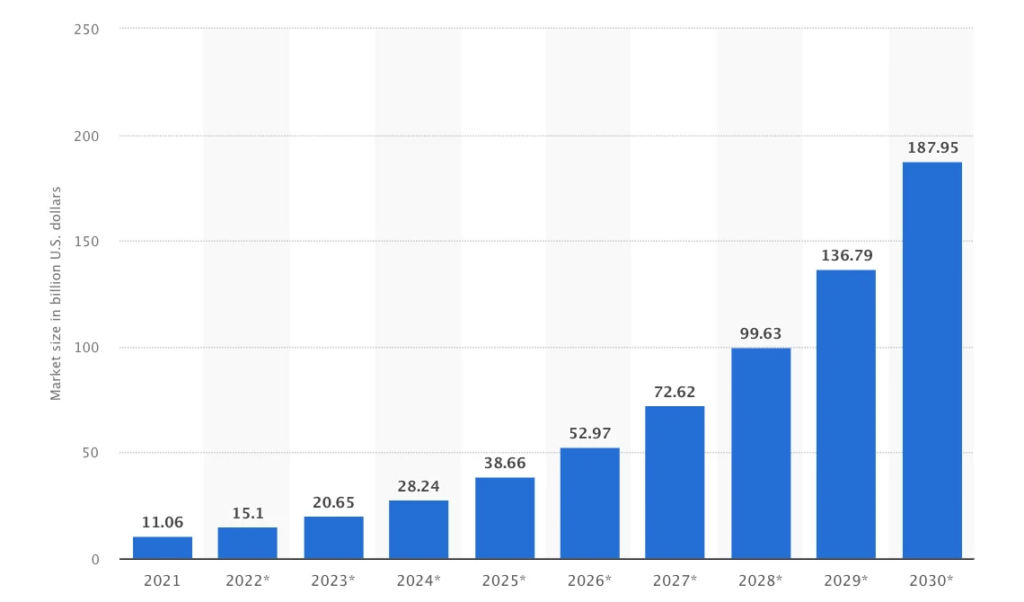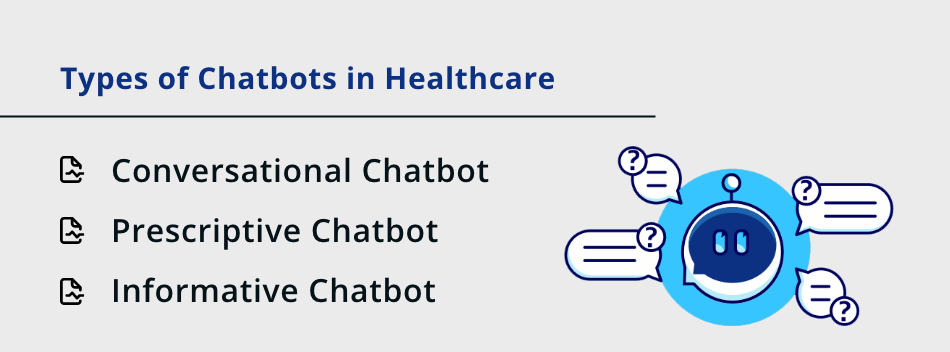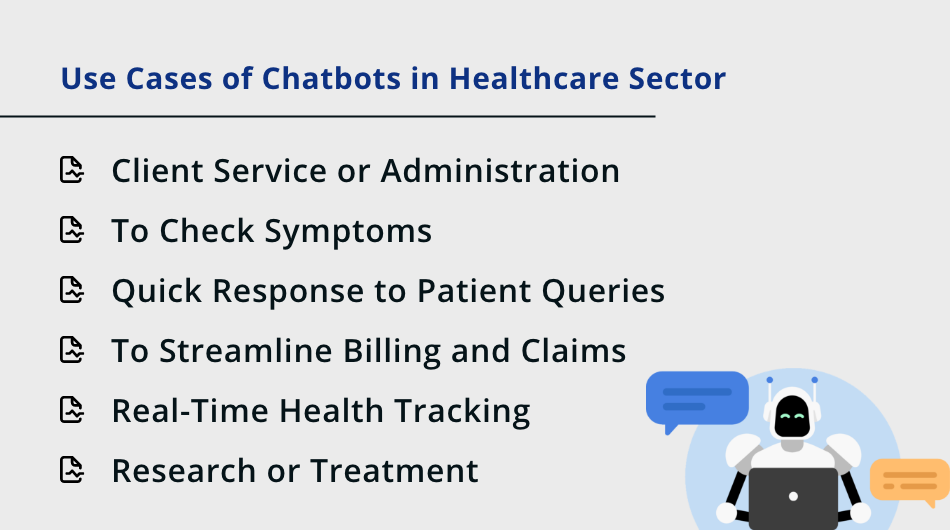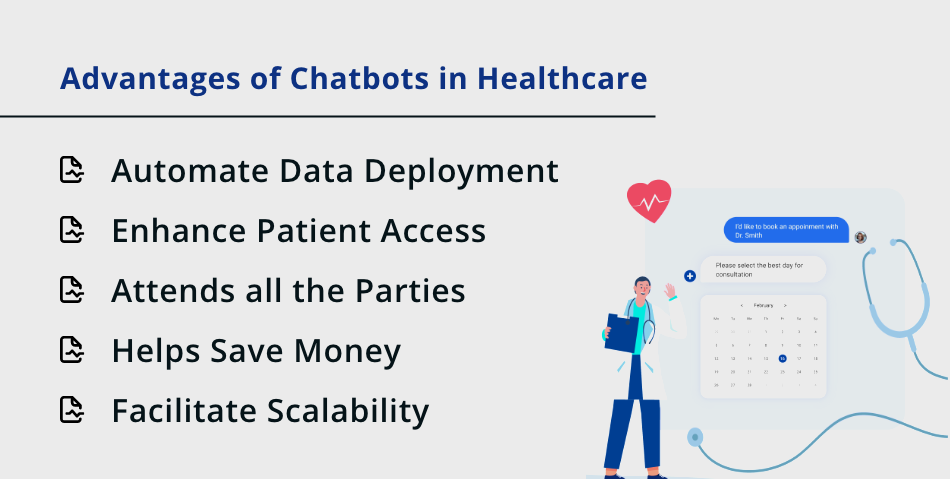The integration of chatbots in healthcare sector helps streamline patient-provider communication and improve healthcare delivery.
Updated 18 April 2024

Director at Appventurez
AI-driven healthcare chatbots mark a transformative era in the rapidly evolving world of healthcare technology. Chatbots in healthcare industry, equipped with AI, and Natural Language Processing are successfully revolutionizing patient care and the administrative efficiency of the industry.
From setting appointment reminders and facilitating document submission to providing round-the-clock patient support, the integration of chatbot development services is enhancing the healthcare experience of both the providers and the patients.
As we further dive into the world of healthcare chatbots, we will explore how they are not just fulfilling the demand for immediate, digital healthcare interactions but also significantly contributing to the improvement of the overall healthcare industry.
In the medical background, AI-enabled chatbots are utilized for prioritizing patients and guiding them in getting relevant information. As per the report, the global AI health market size was $15.1 billion in 2022 and is expected to reach around $187.95 billion by 2030, increasing at a CAGR of 37% from 2022 to 2030.

Chatbots in healthcare are more trustworthy and precise substitutes for an online search that patients carry out when they want to know the reason for their symptoms.
The integration of chatbots in healthcare also assists those patients who are unsure of where they must go to get medical care. Numerous people are unaware of when their conditions need a visit to the doctor and when it is essential to contact a doctor through telemedicine, one of the latest tech trends in the healthcare industry.
Chatbots in healthcare gather primary data from the patients and depending on the input, they provide more data to the patients related to their conditions and recommend further steps also.
While building chatbots in healthcare that involve and offer solutions to users, it is important to identify what kind of chatbot would most efficiently accomplish this goal. Primarily three basic types of chatbots are developed in healthcare.
They vary in the types of solutions they offer, the depth of communication, and their conversational style.

Conversational chatbots in healthcare are developed for being contextual tools that offer responses depending on the user’s purpose. Nevertheless, there are various maturity levels to a conversational chatbot- not all of them provide a similar intensity to the conversation.
Conversational chatbots utilize NLU (Natural Language Understanding), NLP (Natural Language Processing), and apps built with artificial intelligence development services that power devices for understanding human intent and language.
Prescriptive chatbots are conversational by design, they are developed not only to offer directions or answers but also to provide therapeutic solutions.
Informative chatbots in healthcare offer useful data for users, sometimes in the form of breaking stories, notifications, and pop-ups. The chatbot developers must use different chatbots for offering value to their audience. You need to know your audience, what suits them the most, and what chatbots work for what settings.
Since artificial intelligence in healthcare sector is still an innovation, these tools cannot be completely responsible when it comes to the patients’ engagement beyond client service and other fundamental jobs.
Here are some of the important chatbot use cases in healthcare that describe what possible advantages they promise to patients, medical service providers, and doctors.

In order to evaluate a patient’s symptoms and assess their medical condition without having them visit the hospital, chatbots are currently being employed more and more. One of the prominent chatbot healthcare use cases is that it can use the information and assist the patients in identifying the illness responsible for their symptoms based on the pre-fetched inputs.
Chatbots have become one of the essential features considered by developers while following a healthcare mobile app development guide. Hence, chatbots continue to help users navigate services about their healthcare. In this regard, chatbots may be in the future issue reminders, schedule appointments, or help refill prescription medicines.
The frequently asked question area is one of the most prevalent elements of any website. For instance, chatbots in healthcare facilitate quick queries to questions such as:
With this feature, patients are not required to call the clinic or spend time on the site navigation to find the data they require.
Nobody wants to handle the medical bills, insurance agencies, and claims. With the use of chatbots in healthcare, users are provided with information on insurance coverage, help file claims and track claim status. Moreover, these chatbots can also help doctors with billing inquiries and the pre-authorization procedure.
Harnessing the strength of data is another scope- especially machine learning- for assessing data and studies quicker than ever. With the continuous outflow of new cancer research, it is difficult to keep the records of the experimental resolutions.
Patients who need healthcare support regularly can also get the advantage of chatbots in healthcare. For instance, medical providers can utilize bots to make a connection between the patients and the doctors.
Such bots can offer detailed health conditions and help analyze the impacts of the prescribed medicine.
AI-enabled chatbots in healthcare provide a bunch of benefits to institutions as well as patients. Some of the advantages are:

Patients are not restricted to the office hours of the doctors or the institutions and can receive the information they seek at any time of the day or night.
Data that is enabled for being distributed through the bots can be sent as required, at any time. Moreover, the transaction can be smoothly handed over to a human whenever required.
Chatbots in healthcare are able to manage a wide range of healthcare inquiries, including appointment booking and medication assistance. The advanced technology helps the healthcare business save a lot of money.
It is only possible for healthcare professionals to provide one-to-one care. Chatbot technology in healthcare assists and engages several clients at once without degrading the level of contact or the information provided.
Chatbots in healthcare also allow patients to communicate with specialists using traditional methods, including phone calls, video calls, messages, and emails to increase engagement.
When a human employee receives a lot of requests, the medical institution must hire more people. However, the integration of an AI chatbot in healthcare facilitates the interaction with countless patients.
The cost of developing a chatbot in healthcare or any other industry depends on the features and functionalities of the system. The cost of developing a chatbot is further explained in the points below:
Healthcare is one of those sector that is expected to see unprecedented growth in the near future. With the latest technologies such as AI, ML, and IoT, the future of telemedicine in healthcare seems to be bright and acceptable among users.
There is no doubt that there is a lot of room for enhancement in the healthcare industry when it comes to advanced tech solutions.
The rates of cloud adoption are on a higher level and a growing number of healthcare providers are now seeking new ways for organizing their procedures and reducing the waiting time for the patients.
While navigating through what the future holds for the chatbots in healthcare sector, we could understand it through the following points:
Chatbots in healthcare have transformed the way patients and doctors choose to communicate with each other. With data that can be accessed at any time, chatbots in the healthcare sector are proving to be an efficient tool for healthcare institutions.
Appventurez, as one of the prominent AI app development companies, provides its expertise for the development of advanced chatbots in healthcare app development services that enhance patient engagement and enable them to communicate with the hospital staff.
Our collaboration for the integration of AI chatbots in healthcare will help you boost efficiency, reduce the pressure on healthcare professionals, and provide effective results to patients.
Q. What are the top healthcare chatbots?
Some of the well-known healthcare chatbot examples are Babylon Health, Ada Health, CancerChatbot, and Safedrugbot, etc.
Q. How AI is used in healthcare?
Artificial intelligence is primarily utilized to increase speed and accuracy in the healthcare realm. Some of the current uses of AI in healthcare include diagnosing patients, where the AI algorithms analyze medical imaging data, such as X-rays, MRIs, and CT Scans to assist healthcare professionals in accurate and swift diagnosis.
Q. How does a chatbot operate as a healthcare consultant?
A healthcare chatbot can provide information on symptoms and other health-related queries, make suggestions for fixes, and link users with nearby specialists who are qualified in their fields. People with chronic health issues, such as diabetes, asthma, etc, can benefit most from it.


Elevate your journey and empower your choices with our insightful guidance.

Director at Appventurez
Director and one of the Co-founders at Appventurez, Chandrapal Singh has 10+ years of experience in iOS app development. He captains client coordination and product delivery management. He also prepares preemptive requisites and guides the team for any possible issues on a given project.
You’re just one step away from turning your idea into a global product.
Everything begins with a simple conversation.